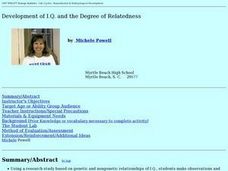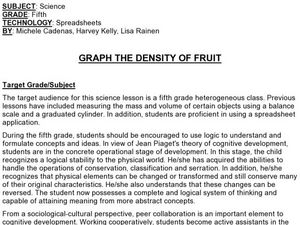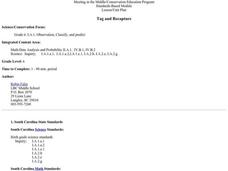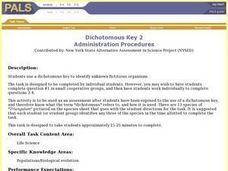Curated OER
The Siberian Arctic
Students, in groups, research the topics: habitats of northwestern Siberia, reindeer, oil and natural gas, and other threatened regions of the Arctic. They answer specific research questions based on their topic. They use online...
Curated OER
Watersheds
Students discover the importance of watersheds and how they impact other bodies of water. Using a map, they identify and analyze a watershed in their local area and evaluate the health of the water nearby. In groups, they plan their...
Curated OER
Migration
Students explore migration using the Internet and several pre-chosen websites. In this animal migration lesson students divide into groups and complete a lab activity.
Curated OER
The Water Cycle
Fifth graders review and discuss, "The Water Cycle" and its key elements of evaporation, condensation and precipitation. They create a terrarium in groups to connect concepts of The Water Cycle and to view precipitation, condensation,...
Curated OER
Soil Layers
Ninth graders identify the different layers of soil. In this earth science lesson, 9th graders explain how limestone layers are formed. They identify the different parts of the coral colony.
Curated OER
Changing Attitudes about Nature Through Bird Identification
Students, in groups, learn and review bird flash cards, after hearing stories about the birds from the teacher. They participate in labs such as owl pellets, feathers, etc.
Curated OER
A FOREST'S PLACE IN OREGON
Students engage in a lesson to find the purpose for the forests of Oregon. The role of the forest is researched according to different geographic perspectives. The information is portrayed in graphs and presented by group members to...
Curated OER
Development of I.Q. and the Degree of Relatedness
Studnets, in groups, analyze data regarding genetic and nongenetic relationships of I.Q. They make observations and discuss correlations from a diagram. Cooperative learning teams discuss a given set of questions and present information...
Curated OER
Energy Audit
Students examine the level of energy usage on a local and national level. Using the internet, they discover ways to conserve energy every day and how over-consumption of energy negatively affects the environment. In groups, they...
Curated OER
Graph the Density of Fruit
Fifth graders review the definition of mass and volume. They calculate and graph the density of various types of fruit while working in groups on a spreadsheet program. They look at how size of the fruit can be similar but the weight is...
Curated OER
The Effects of Ultra-Violet Light on Yeast
High schoolers work in small groups collecting and analyzing data as they learn how to best grow yeast. This lesson plan allows students to conduct several student-created experiments as they continually generate questions and...
Curated OER
Digging Deeper
Fifth graders write a report. In this research lesson, 5th graders work in groups to complete an Internet scavenger hunt. Students research an area of health related to nutrition or exercise, write a report and present their report to...
Curated OER
Dr. Dirt's Archaeology Lab Artifact Analysis
Young scholars simulate analyzing artifacts in archaeological lab by using real techniques that archaeologists use. Students practice measuring skills, drawing, writing, and brainstorming, and make inferences based on evidence.
Curated OER
Tree of Life
Students explore the importance of the tropical rain forest in different cultures. Through a cooperative game, they locate countries that are known for their forest resources. Students discuss the similarities and differences of various...
Curated OER
Animated Video Productions - Life Cycles
Seventh graders compare/contrast the life cycles of free-living organisms to that of parasites. They conduct Internet research, illustrate the stages of a specific organisms's life cycle, and direct and produce a mini-video production.
Curated OER
Explore the Effects of Immigration
Students explore the effects of immigration on the immigrants and on society as a whole. They will record the experiences of specific immigrant groups using an E-sheet. Groups present a summary of what they learned about their ethnic...
Curated OER
Cosmetic Products Evaluation
Students evaluate different cosmetic products. For this chemistry lesson, students determine the physical and chemical components of their samples. They perform various test such as pH, viscosity, conductivity and formulate a conclusion...
Curated OER
Naturally Disastrous!
Students explore, research and examine the causes of natural disasters and how to survive them. They research on the internet world climate, recent disasters, how they happen, what to do if one occurs and what preventive measures to take...
Curated OER
Our Inventions
Young scholars construct or draw an invention of their own design. In this problem solving instructional activity, students define the word invention, discuss famous inventions, invetors, and how inventions come about. Young scholars...
Curated OER
Community Cell
Students explore parts and functions of the cell, and create models of assigned organelles.
Curated OER
Water Treatment Plant
Second graders create their own water treatment system. In this water treatment lesson, 2nd graders create the water treatment system and record how it works. Students list materials they used and write about what they saw. Students then...
Curated OER
Tag and Recapture
Sixth graders participate in an activity in which colored jelly beans represent fish in a lake--10 green jellybeans per "lake" representing tagged fish. They draw from the beans (fish) and record the number of tagged fish they draw...
Curated OER
Dichotomous Key 2
Students use a dichotomous key to identify unknown fictitious organisms in an assessment designed to be used after a discussion on the use of a dichotomous keys has occurred. Follow up questions about key included.
Curated OER
Invent on the Spot
The best inventions come from a problem that needs to be solved! Given a container with holes in it, learners must solve how to stop liquid from pouring out. They work together to develop an invention to accomplish this task.

























